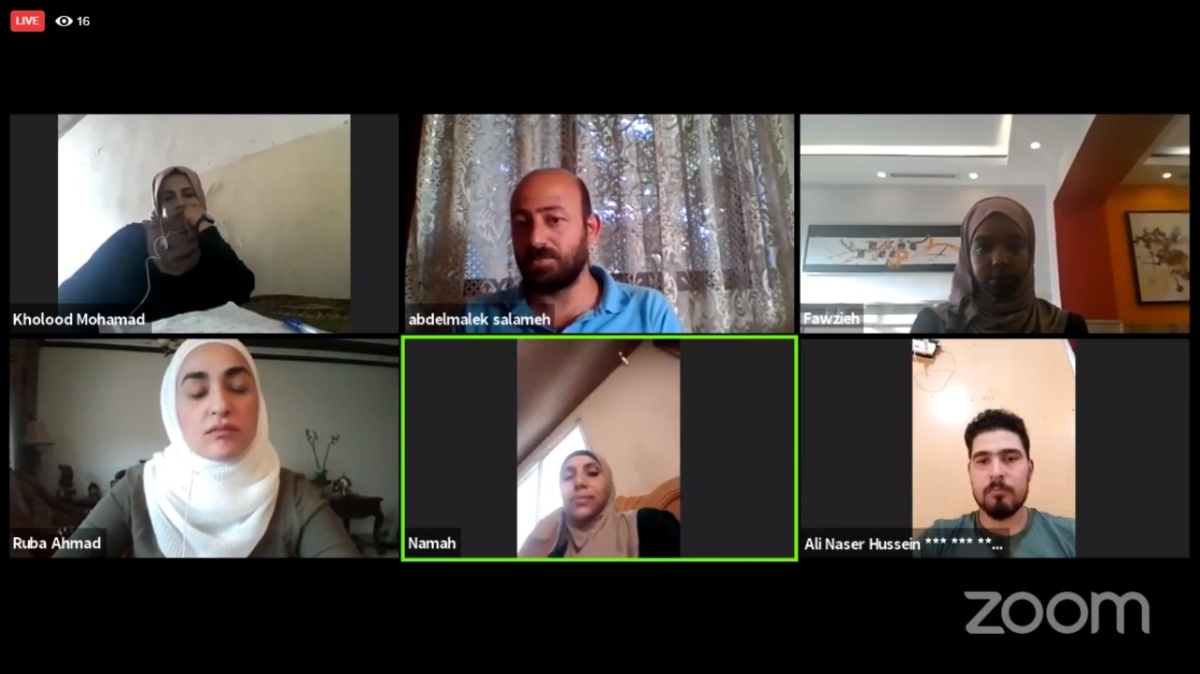As part of “Voices and Future of Refugee Youth from and in the Arab World” week, marking World Refugee Day, Arab Renaissance for Democracy and Development (ARDD) hosted a special edition of the Regional Dialogue Sessions that addressed the conditions of refugees, including persons with disabilities (PWD), in the region during the COVID-19 pandemic.
The activity, one of ARDD’s contributions to programs that shed light on the conditions of refugees in the region and hope to make better heard the voices of the most marginalized groups among refugees, was held at the beginning of the week, on Wednesday, 16 June 2020.
Speakers at the event were: Senior Policy Advisor to the United Nations High Commissioner for Refugees (UNHCR) for the Middle East and North Africa Shaden Khallaf, immigration expert and professor at the American University in Cairo Dr. Amira Mohamed, Secretary General of the Higher Council for the Rights of Persons with Disabilities, Jordan, Dr. Muhannad Al-Azzeh and President of the Lebanese Physically Handicapped Union Silvana Lakkis. They all stressed the importance of institutionalizing all-encompassing social protection, and ensuring that refugees, including those with disabilities, are guaranteed their rights and are included in the decision-making process, particularly concerning issues pertaining to their future.
On World Refugee Day, ARDD launched its new study “Voices of Palestinian Refugee Youth across the Near East: Socio-Political Participation and Aspirations”, which sheds new light on the Palestinian refugees by focusing on a usually politically marginalized segment of their communities: youth, whose perceptions about their status within their communities and within their host societies, and aspirations for the future are important albeit often muted.
The study focused on youth who are – or aim to be – politically and socially active, primarily from camps in Jordan, Lebanon, the occupied Palestinian territory and Syria. Involving over 100 young Palestinians of both genders (most with current or past experience in social programs or volunteer activities), the study tried to capture, through focus group discussions and one on one interviews, the voice of these youth on issues of importance to them, like: their social and political status within their communities, the larger Palestinian ‘polity’ and the host society at large; the challenges and opportunities that shape their socio-political mobilization; their political consciousness as Palestinians and as young (camp) refugees; and how these factors intersect with and impact their aspirations.
When it comes to the future, the study identified trends among youth. On the one hand, there is an organic connection between individual aspirations and collective issues concerning the future of Palestine and the Palestinian (refugee) people at large. As with past generations, youth remain vocal advocates of the right of return, which they describe as existential, sacred and immutable. On the other hand, they believe that their quest for the right of return and the right to self-determination cannot be achieved at the expense of their human rights, namely other rights. They also believe that pending a settlement of the Palestinian refugee question, UNRWA’s mandate should be preserved and its activities enhanced.
The study revealed that youth see no future while remaining marginalized, poor, disenfranchised, stateless and “deprived of the right to have rights” in their (host) societies.
Pending their “Return” to Palestine, they ask for overall empowerment through: capacity building, good education, access to decent jobs and, last but not least, “political space”. Empowerment is seen as critical to the realization of their aspirations. However, these aspirations are ,which are expressed in different ways, according to the reality in which they live: “living one’s Palestinian-ness” while remaining “loyal to the state” in Jordan; getting “recognition” and “rights as human beings” in Lebanon and in the oPt; and “helping the [Palestinian] cause everywhere”, including from the diaspora, as the respondents from Syria said.
Emphasizing the importance of amplifying refugee voices, ARDD took part in a dialogue session on Sunday, 21 June 2020, with representatives of local and international actors and partners, representatives of the Palestinian Affairs Department and the Ministry of Youth, local CSOs, such as Tami and Habaq, and relevant government agencies in Jordan, through during which the study’s findings and recommendations were highlighted and the youth’s voices heard.
At the end of the meeting, the speakers unanimously agreed on the importance of creating a participatory mechanism that includes all the parties concerned, working to integrate refugee youth in host societies, enabling them to contribute to the betterment of the refugees themselves and of the host countries, and to accede to their rights.
On Sunday, ARDD also held an interactive dialogue in a special World Refugee Day edition of #AlNahdaYouth sessions, titled “Refugee Youth Voices: Challenges and Aspirations”, whose speakers represented Syrian, Somali and Palestinian refugee communities in different regions in Jordan. The session offered an insight into the intricacies of refugee experiences and revealed common aspirations and priorities youth have for the future.
The speakers, Abdelmalek Salameh, a Palestinian refugee from Nassr Camp, Naameh Abu Shlouf and Khuloud Abu Haleeb, Palestinian refugees from Jerash Camp, Fowzia Abdallah Abu Shegowa, a Somali refugee residing in Amman, and Ali Nasser Ali Hussein, a Syrian refugee residing in Zaatari Camp, stressed the importance of not giving in to the circumstances and of working on demanding their rights. They also emphasized the importance of involving refugees in decisions about the aid and support provided to them and reaffirmed their wishes and aspirations to be an active part of the host community through positive social participation and hard work.


